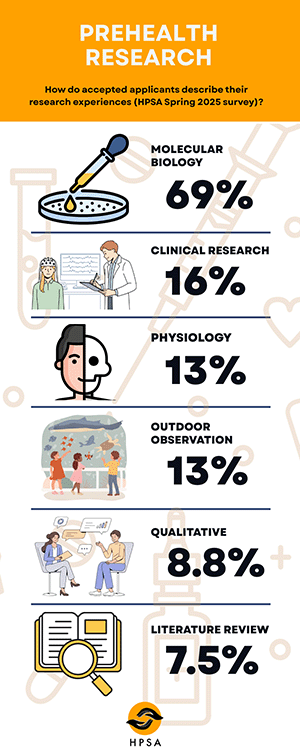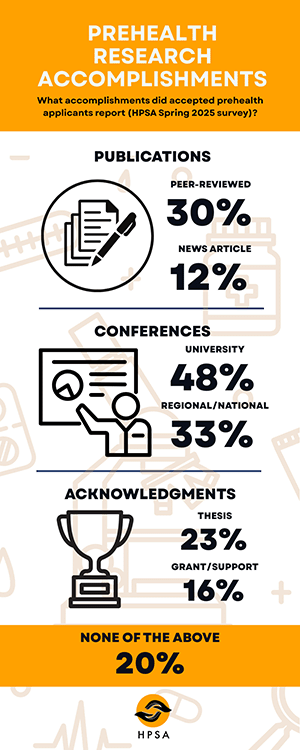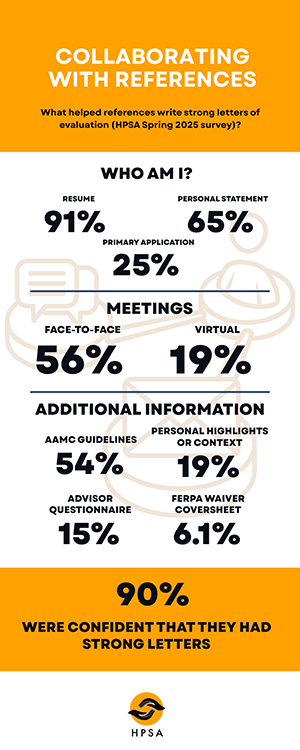Prehealth applicants worry about the importance of a research experience in the application process. Research experience offers a rewarding opportunity to work under mentored guidance, unlike the impersonal atmosphere of a large lecture hall or the constraints of a small classroom, and can help with obtaining faculty references. Even though many health professions admissions officers downplay the importance of research for acceptance, for many prehealth/premed students, research is considered an unspoken requirement. AMCAS school profiles show that over 75% of incoming students claim to have a research experience before matriculation.
The Spring 2025 Applicant Experience Survey looked at the type of research conducted by accepted students and the role research had on their competitiveness and program choice. I also wanted to know how applicants managed to secure letters of recommendation from professors.
We received 115 completed responses, with 99 receiving offers of admission for the entering class of 2025. Seventy-five respondents were accepted to medical school (MD/DO), eight to dental schools, and 15 to veterinary school. We focused on the applicant’s relationship with faculty references and how they felt research was valued among the schools where they interviewed.
Research Experience Categories and Outcomes
Prehealth applicants engaged mostly in bench-related research typically found in universities and medical centers. Seventy-eight described their research as molecular biology, physiology, or clinical research. Other research included observational studies (outdoor or simulated), qualitative interviews, or literature reviews.
Accomplishments cited by applicants include posters or presentations for a conference, earning authorship in a peer-reviewed article, or receiving recognition for their accomplishments (honors thesis or an award supporting their work). About half of the respondents presented their research at a department or university showcase. In addition, about 20% of respondents disclosed that they did not have any of these accomplishments when they applied.
Over 80% of respondents highlighted research in their applications. Seventy-five percent of respondents said their research was a topic during their interviews. Respondents felt that research contributed 50% (median) to the effectiveness of their applications, but they considered research as less critical in their school lists (median 37.5% effect).
Respondents’ advice about including research experience in their applications are summarized by Microsoft Copilot:
- Importance of Research: Research is considered crucial for dual-degree programs like MD/PhD and research-heavy schools. It can open doors and validate an applicant’s commitment to scientific inquiry.
- Publications and Productivity: Publications are often valued more than hours spent in research. However, lack of publications does not necessarily undermine the significance of research experience.
- Program Dependency: The emphasis on research varies by program. For some schools, it is a key factor, while for others, it is less relevant or just a checkbox.
- Presentation and Narrative: The ability to articulate research experiences clearly and connect them to personal contributions is often more impactful than the accolades themselves.
- Clinical vs. Research Experience: Clinical experience is sometimes prioritized over research in interviews, though research can still contribute to skills like critical thinking and independence.
- Mixed Perspectives: Some applicants felt research was essential, while others found it irrelevant or overemphasized. The “research arms race” was noted as a growing concern.
Research for the Rest of Us
Curious how “average” students can get involved in research? Check out our series “Research for the Rest of Us” by Trevor Hunt, where he breaks down the basics of getting involved in and sharing your research.
Building Strong Faculty Relationships for References
While most took a class given by their professors (98%), over half of the respondents worked for a professor in their lab (58.2%) or as a teaching assistant or other administrative role (49.0%). Some respondents commented that they shared similar interests or hobbies outside of a classroom setting (21.0%). Only 6.1% described their relationships with a professor used as a reference as superficial.
Generally, students had their faculty supervisor author their reference letter (48.5%); 42.6% did not have a “research letter” in their letter packet. A small percentage (10.1%) had a graduate student or postdoc contribute to an evaluation, cosigned by the supervising faculty member.
Respondents often provided materials that added context to the reference letter. Most gave their references a resume highlighting their overall accomplishments (90.8%) and a draft of their application personal statement (65.3%) or primary application (24.5%). Respondents generally scheduled a face-to-face meeting (56.1%) or a virtual appointment (19.4%) to request a letter. While most provided guidelines for reference letters provided from their prehealth office of AAMC (54.1%), many also suggested additional highlights or context (19.4%). About 15% completed a questionnaire as part of their prehealth office’s process for an institutional/committee evaluation. Only 6.1% gave their references a cover sheet for their letter, which disclosed their consent to waive their FERPA rights.
Most applicants considered their application letters of recommendation as “very strong or enthusiastic” (53.1%) or “strong and confirming” (38.8%). Only 4.1% were unsure how strong their reference letters were.
Most applicants managed their reference letters through a dossier subscription service (43.9%). Many others relied on the central application service’s letter management programs (28.6%) or their prehealth office’s resources (19.4%) or a contracted dossier service they used (10.2%). A handful of respondents asked their references to send letters directly to each program (9.2%) or submit a rating form (1.0%). Respondents spent a median of $30 to deliver letters (interquartile range $0 to $70).
Respondents’ advice about securing and delivering letters of recommendation are summarized by Microsoft Copilot:
- Cost of Services: Some applicants had to pay fees for services like Interfolio or prehealth advising offices to collect and deliver letters, while others reported no costs or complimentary services.
- Challenges with Letter Writers: Issues included unresponsive or neglectful recommenders, difficulty obtaining letters from professors, and challenges for non-traditional applicants needing older references.
- Use of Interfolio and Other Platforms: Interfolio was commonly used, with mixed reviews. Some found it convenient, while others found it unintuitive or unnecessary compared to other services like that from the AAMC.
- Prehealth Advising Office Support: Experiences varied widely. Some offices provided streamlined, efficient processes, while others caused delays or lacked services like committee letters.
- Self-Management: Many applicants managed the process independently, coordinating directly with letter writers or using platforms like AMCAS or VMCAS.
- Process Efficiency: Positive experiences highlighted streamlined systems, early planning, and clear communication, while negative experiences included delays, lost letters, and unclear instructions.
- Ethical Concerns: Some comments raised concerns about fabricated letters and the need for reforms in the recommendation process.
Obtain Compelling Reference Letters
Learn how to work with your letter writers to help them write the strongest letters possible.
Timeline for Reference Requests
Based on messaging from admissions teams, respondents felt letters were required to complete the initial pre-interview screening process (85.3%). About 30% of respondents were told letters must be received before being invited to interview, but were not required for initial screening. Fewer respondents were told letters must be received before interview day (5.3%) or after interview day to receive a final admissions decision (1.1%).
Most applicants used the winter/spring months to secure their references, with peak requests occurring in April and May. After applicants could submit their primary application, most received confirmation of the receipt of their letters in May, June, and July.
While most respondents received no feedback about their letters of recommendation (69.4%), many respondents reported positive feedback about their letters (21.4%). Few (8.2%) were told that at least one of their letters did not satisfy expectations (missing a signature, not on letterhead) as their application was screened for interview consideration.
Summary of Findings
The research profile of accepted applicants, based on the Spring 2025 Applicant Experience Survey, suggests the following:
- Most applicants engage in biochemical, molecular, or cell biology research, but applicants with qualitative social science, field/observational study, or literature reviews are also successful in gaining admission.
- Around half of all applicants had presented their work as a poster or oral presentation at a conference (on-campus or regionally/nationally). While many applicants strive to show productivity in their research, 20% did not have a presentation or manuscript by the time their applications were submitted.
- Most applicants had a letter of recommendation from their research supervisor, while some had a co-signer from a graduate student or staff scientist/postdoc who directly managed the candidate.
- Most candidates asked for letters of recommendation beginning in the winter/spring term, months before the application window opened.
These insights help applicants understand how much research contributes to their application profile. Many respondents said their research was a topic in their interviews or conversations with school representatives and felt it made a big difference for a desirable application profile. While productivity (presentations and publications) may be valued for applicants pursuing a PhD-combination track, a research experience is not necessary for traditional applicants’ success.
However, future research opportunities have been under threat since the start of 2025. Disruptions in research funding have denied many undergraduate and graduate students a chance to explore fundamental, clinical, or public health research. Many faculty and staff in research and pathway programs were subject to furloughs, layoffs, and terminations as support was suspended, reducing access to potential reference letter writers. International students may feel unsafe knowing that political decision-makers could end their projects or that they could be detained or forced to leave the United States due to sudden policy changes. Opportunities to do student research or graduate study outside the United States may become more available, but these opportunities will favor those who can afford to take advantage. Coupled with proposed restrictions on federal financial aid, health professional careers that require doctoral-level training may be further out of reach for many from challenging socioeconomic backgrounds. Future HPSA surveys may investigate how restricted research opportunities shape someone’s aspirations to be prepared as a health professional student or for specific residency opportunities.
Watch for future reports on the Accepted Applicant Experience Survey! We thank everyone who contributed to these findings and welcome more participation when the next survey is open!



